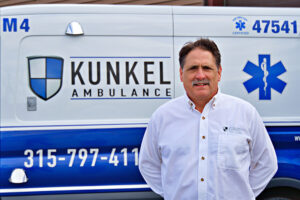By Barbara Pierce

Vincent Faraone began his career as an EMT nearly 40 years ago. He is now the director of Kunkel Ambulance Service in Utica.
Kunkel Ambulance provides 911 emergency services to Oneida and Herkimer counties and is responsible for transporting patients to and from hospitals.
Q: How did you become an EMT?
A: In 1985, I became an EMT. I’d always been interested in this. As a kid, I backpacked into the woods, going to places where there was no doctor. But the thing that pushed me over the edge was an incident that happened when I was out in the woods, hunting with an old man. He had heart trouble. One day when out there in the woods, he had a heart problem and needed to stop and lean against a tree. I helped him take a nitroglycerin tablet he carried with him. This incident led me to take an EMT course and I joined the volunteer ambulance corps in Syracuse as a volunteer.
Q: How did you go from EMT to director of Kunkel Ambulance?
A: I started as a volunteer in Syracuse, then became an EMT, working part-time for Syracuse Ambulance to better my skills. They offered me a full-time job, which I really liked and did for years. I went to school to become a paramedic.
Q: How do paramedics differ from EMTs?
A: EMTs handle broken bones and do life-saving care to people. Paramedics are more highly trained and capable of more advanced medical procedures such as cardio procedures. Paramedics depend on the EMTs. Without a good EMT to do the footwork, they can’t function. Our EMTs are a huge help.
Q: How did your career lead to director at Kunkel Ambulance?
A: In 1995, when I was a paramedic in Syracuse, Kunkel was looking for a director of operations, so I moved to Utica and became their director of operations. Then I left to work for the state as regional EMS coordinator. When Kunkel sold to Priority Ambulance in 2016, they offered me a position. (Priority Ambulance is a national corporation; we’re still known as Kunkel Ambulance.) I was fortunate to move up to my current position with them. I’ve been blessed. Though now I spend my time on finances, payroll, purchasing, hiring and staffing, I’ve maintained my paramedic skills.
Q: Kunkel Ambulance handles 911 calls and provides transportation between medical facilities.
A: 75% of our work is 911 calls. Every 911 call in Oneida or Herkimer County gets transferred to us. We do our own dispatching. Each ambulance is staffed with skilled, certified paramedics and trained EMTs. Our ambulances are equipped with the latest technology. We work closely with hospitals, communicating before our ambulances arrive so the hospital is prepared for the patient. 25% of our work is transporting patients to and from hospitals.
Q: How have things changed in emergency medical services?
A: What’s changed is that our health care system isn’t as good. To see a doctor, you’ve got to wait three months. Many of the people we see don’t even have a primary care physician. Or their physician doesn’t handle calls outside of business hours. Many don’t have insurance. You can’t see your doctor when you’re in a crisis. It’s a failure of the system.
COVID did much harm. A lot of talented nurses left the field, some because they didn’t want to get vaccinated, others because they didn’t want to deal with an unknown illness. That’s happened, not just here, but on a nationwide level.
Q: Are you looking to hire people? What characteristics are you looking for in the people you hire?
A: We’re always looking for people.
What kind of people am I looking for? I can teach you to be an EMT, but I can’t teach you how to be a good person. I’m looking for good people. You have to have compassion. I can’t emphasize that enough. People are scared when we see them; they’re not on their best behavior. EMTs have to understand this is the worse day of that person’s life and have empathy. TV shows glorify emergency services; the real world isn’t like that.
Sometimes we deal with life and death situations, but most of the people we see aren’t going to die. They do need someone with compassion to help them get through this crisis. Hold their hand, do whatever helps. We look for people that have that ability. Some people come to us already certified as an EMT. Others haven’t had any experience and that’s OK; we’ll train you and get you certified.
Q: Working in emergency medical services means undergoing considerable stress and immense pressure every day. How do you and your employees manage this stress?
A: You have to take your job seriously; know you’ve done the very best for that person. We’re good at keeping people alive, but we don’t have the depth of knowledge that doctors have. We stabilize the patient and get them to care. There are good days and there are bad days.
We really do make a difference; we do so much life-saving intervention for people.
